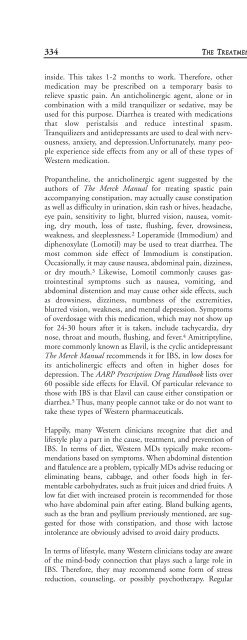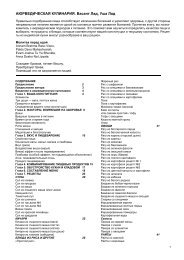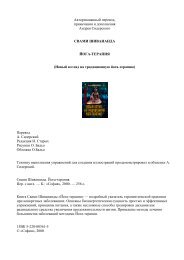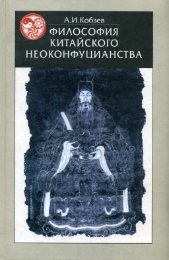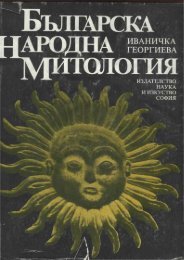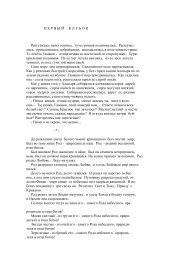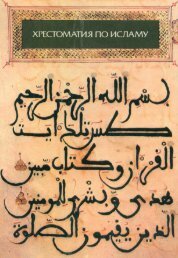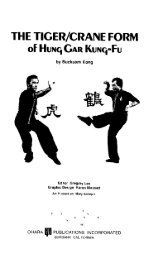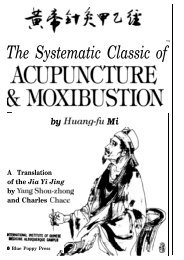The Treatment of Modern Western - Biblio.nhat-nam.ru
The Treatment of Modern Western - Biblio.nhat-nam.ru
The Treatment of Modern Western - Biblio.nhat-nam.ru
- No tags were found...
Create successful ePaper yourself
Turn your PDF publications into a flip-book with our unique Google optimized e-Paper software.
334 THE TREATMENT OF MODERN WESTERN DISEASES WITH CHINESE MEDICINEinside. This takes 1-2 months to work. <strong>The</strong>refore, othermedication may be prescribed on a temporary basis torelieve spastic pain. An anticholinergic agent, alone or incombination with a mild tranquilizer or sedative, may beused for this purpose. Diarrhea is treated with medicationsthat slow peristalsis and reduce intestinal spasm.Tranquilizers and antidepressants are used to deal with nervousness,anxiety, and depression.Unfortunately, many peopleexperience side effects from any or all <strong>of</strong> these types <strong>of</strong><strong>Western</strong> medication.Propantheline, the anticholinergic agent suggested by theauthors <strong>of</strong> <strong>The</strong> Merck Manual for treating spastic painaccompanying constipation, may actually cause constipationas well as difficulty in urination, skin rash or hives, headache,eye pain, sensitivity to light, blurred vision, nausea, vomiting,dry mouth, loss <strong>of</strong> taste, flushing, fever, drowsiness,weakness, and sleeplessness. 2 Loperamide (Immodium) anddiphenoxylate (Lomotil) may be used to treat diarrhea. <strong>The</strong>most common side effect <strong>of</strong> Immodium is constipation.Occasionally, it may cause nausea, abdominal pain, dizziness,or dry mouth. 3 Likewise, Lomotil commonly causes gastrointestinalsymptoms such as nausea, vomiting, andabdominal distention and may cause other side effects, suchas drowsiness, dizziness, numbness <strong>of</strong> the extremities,blurred vision, weakness, and mental depression. Symptoms<strong>of</strong> overdosage with this medication, which may not show upfor 24-30 hours after it is taken, include tachycardia, drynose, throat and mouth, flushing, and fever. 4 Amitriptyline,more commonly known as Elavil, is the cyclic antidepressant<strong>The</strong> Merck Manual recommends it for IBS, in low doses forits anticholinergic effects and <strong>of</strong>ten in higher doses fordepression. <strong>The</strong> AARP Prescription D<strong>ru</strong>g Handbook lists over60 possible side effects for Elavil. Of particular relevance tothose with IBS is that Elavil can cause either constipation ordiarrhea. 5 Thus, many people cannot take or do not want totake these types <strong>of</strong> <strong>Western</strong> pharmaceuticals.Happily, many <strong>Western</strong> clinicians recognize that diet andlifestyle play a part in the cause, treatment, and prevention <strong>of</strong>IBS. In terms <strong>of</strong> diet, <strong>Western</strong> MDs typically make recommendationsbased on symptoms. When abdominal distentionand flatulence are a problem, typically MDs advise reducing oreliminating beans, cabbage, and other foods high in fermentablecarbohydrates, such as f<strong>ru</strong>it juices and dried f<strong>ru</strong>its. Alow fat diet with increased protein is recommended for thosewho have abdominal pain after eating. Bland bulking agents,such as the bran and psyllium previously mentioned, are suggestedfor those with constipation, and those with lactoseintolerance are obviously advised to avoid dairy products.In terms <strong>of</strong> lifestyle, many <strong>Western</strong> clinicians today are aware<strong>of</strong> the mind-body connection that plays such a large role inIBS. <strong>The</strong>refore, they may recommend some form <strong>of</strong> stressreduction, counseling, or possibly psychotherapy. Regularexercise is <strong>of</strong>ten recommended to reduce stress and to normalizebowel function in those who are constipated. Later on,we will also talk about these from the Chinese point <strong>of</strong> view.CHINESE DISEASE CATEGORIZATION: This diseaseis mostly categorized as xie tong, painful diarrhea. If there isabdominal distention, this is categorized as fu zhang, whileconstipation is bian bi. <strong>The</strong> symptoms <strong>of</strong> headache, fatigue,depression, and anxiety are all also disease categories in theirown right in Chinese medicine.DISEASE CAUSES: Internal damage by the seven affects,unregulated eating and drinking, unregulated stillness (i.e.,rest) and stirring (i.e., activity), iatrogenesis, and habitualbodily vacuity due to former heaven natural endowment,enduring disease, and/or agingDISEASE MECHANISMS: <strong>The</strong> modern Chinese medical literatureis unanimous in saying that the root cause <strong>of</strong> IBS isalways a disharmony between the liver and spleen. Due toemotional stress and f<strong>ru</strong>stration, the liver may becomedepressed and the qi become stagnant. Qi stagnation thenresults in abdominal distention and pain. Due to worry, lack<strong>of</strong> exercise, overfatigue, improper diet, or over or prolongeduse <strong>of</strong> antibiotics, the spleen may become vacuous and weak.Spleen qi vacuity results in fatigue, lack <strong>of</strong> strength, and downwarddiarrhea. In addition, these two disease mechanismsmutually engender each other. When the liver becomesdepressed, it commonly counterflows horizontally to assail thespleen, thus causing or worsening spleen vacuity weakness.Conversely, if the spleen is vacuous and weak, this may causeor worsen liver depression. This is because spleen qi vacuitymay lead to blood vacuity, and the liver can only functionwhen it receives an adequate supply <strong>of</strong> blood to nourish it.Hence liver depression and spleen vacuity typically go hand inhand in clinical practice. In addition, because <strong>of</strong> their monthlyloss <strong>of</strong> blood, women’s spleens must work harder at producingblood than men’s spleens must. This also predisposeswomen in particular to spleen vacuity and explains why threetimes as many women as men suffer from IBS.If the liver becomes depressed and the qi becomes stagnant,this stagnation may eventually transform into depressive heat.Over time, this pathological heat will damage and consumethe blood, body fluids, and ultimately kidney yin. Spleenvacuity may also lead to blood and, therefore, yin vacuitybecause the spleen is the root <strong>of</strong> blood engenderment and theblood and essence share a common source. Since yin is supposedto control yang, if kidney yin becomes vacuous andweak, liver yang may become hyperactive. Since fire burnsupward and the heart and lungs are located above the liver, thispathological heat may also accumulate in the heart and/orlungs, disturbing either or both heart and lung function.Because the spleen is also in charge <strong>of</strong> moving and trans-


